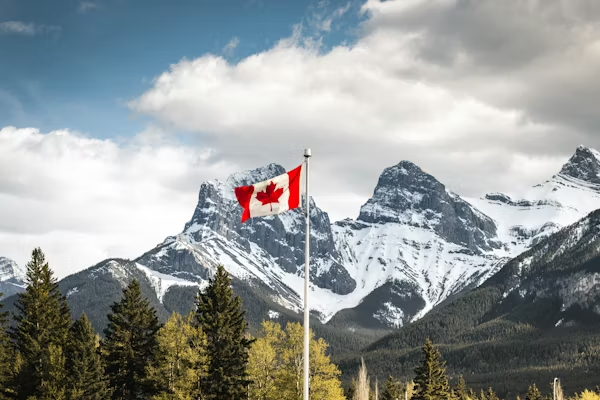Rhetoric surrounding a 51st state has dominated headlines during President Trump’s second term in office, and these ideas have received much scrutiny on the northern side of the border. Recently, these tensions have been reignited by a series of targeted anti-tariff ads aired by Premier of Ontario Doug Ford, which U.S. ambassador to Canada Pete Hoekstra has publicly criticized.
Since Donald J. Trump first mentioned the possibility of Canada joining its southern neighbor, this conversation regarding the 51st state has been brought to the forefront of politics, and behind the humor lies serious questions about sovereignty, identity, and the balance of power in North America. When we consider the question “Could Canada join the U.S.?” it is clear that the economic, political, and cultural realities of the two nations make any 51st state rhetoric largely unfounded.
Canada and the United States share one of the longest undefended borders in the world, a deep economic partnership, and countless cultural similarities. Both countries emerged from European and particularly English colonization, built federal democracies, and enshrined individual rights in their constitutions. Yet their political identities evolved in different directions.
While the United States was born from revolution and a rejection of monarchy, Canada developed gradually through negotiation, compromise, and allegiance to the British Crown. This difference in political DNA remains visible even today. Canadians tend to see government as a tool for social balance and public welfare, while Americans often view it as a necessary limitation to individual freedom. Economically and socially, the two nations are intertwined. Politically and symbolically, they remain worlds apart.
From an economic point of view, supporters of a 51st state point to certain similarities between Canada and the U.S. The two countries already share the United States-Mexico-Canada Agreement, which allows for free trade and integrated supply chains across North America. The United States remains one of Canada’s top trading partners, accounting for roughly 75% of its exports. In many sectors, from energy to automotive manufacturing, the economies of the two nations already function as parts of a single system. The GOP has argued that a merger could, in theory, eliminate border frictions, harmonize regulations, and give Canada more direct influence over economic policies that affect it profoundly.
However, that argument quickly meets reality: Canada’s resource-based economy is structured differently from the U.S.’s industrial and service-driven one.
This is part of the reason why the U.S. is so interested in Canada: they need Canadian water and rare earth metals to run their industries. These resources are becoming increasingly strategic, as China, with whom the US is in a commercial war, is the first producer of rare earth and controls almost 60% of global production.
Furthermore, any advantages that a union could represent for both the US and Canada, such as harmonizing taxation codes, healthcare systems, labor laws, and environmental standards, would undoubtedly be offset by immense political and social disruption. Canadians’ universal healthcare system, for instance, stands as a symbol of national pride that contrasts sharply with the privatized American model.
From a constitutional standpoint, the union of Canada and the United States is also almost impossible. The U.S. Constitution provides a pathway for new states to join the Union, but it has never been done for an actual sovereign nation. Admitting Canada would require a constitutional amendment, ratified by two-thirds of Congress and three-fourths of state legislatures. On the Canadian side, the obstacles are even greater. Canada’s Constitution defines it as a sovereign monarchy under the Crown, with its ten provinces and three territories enjoying significant autonomy. Joining the U.S. would mean renouncing the British monarchy, rewriting the Charter of Rights and Freedoms, and dissolving the federal balance that defines Canadian governance. Such a move would require unanimous consent from all provinces; this is politically unthinkable in a country where even modest constitutional reforms have proven nearly impossible to implement since the 1990s.
Economic and political hurdles aside, cultural differences might be the most decisive barrier. To many Canadians, being “not American” is part of what it means to be Canadian.
Thus, a large part of the Canadian population would not accept being absorbed by their loud neighbor. Canada’s emphasis on bilingualism (especially in Quebec) and social equity gives deliberate counterpoints to the more individualistic American ethos. According to Global News, seven out of ten Canadians won’t accept becoming American citizens. The emotional attachment to national symbols from universal healthcare to the maple leaf flag remains far stronger than any practical arguments for integration.
From the American perspective, annexing Canada would be a logistical challenge, but a huge geopolitical gain. Canada’s vast natural resources, Arctic territory, and advanced infrastructure would significantly strengthen America’s global position. However, the inclusion of 40 million new citizens with a distinct political culture would alter the U.S. federal system beyond recognition. Adding a new state would reshape Congress, shift electoral power northward, and potentially change the balance between liberal and conservative regions.
So, could Canada ever become a U.S. state? Legally, politically, and culturally, the answer is almost certainly no.
Donald Trump probably mentioned the fusion of the two countries less as a proposal than as a means of exerting pressure in negotiations on taxation and trade.
Overall, this issue highlights the deep ties between the two nations, which share common values and interests, but express them differently. Perhaps it is this balance between closeness and difference that makes the Canada-U.S. relationship so unique. By remaining separate yet intertwined, the two countries can collaborate on common goals while preserving what makes them distinct. In this sense, the debate over Canada as a potential 51st state is less about any realistic possibility that this would happen and more about understanding the dynamics of the North American partnership.








